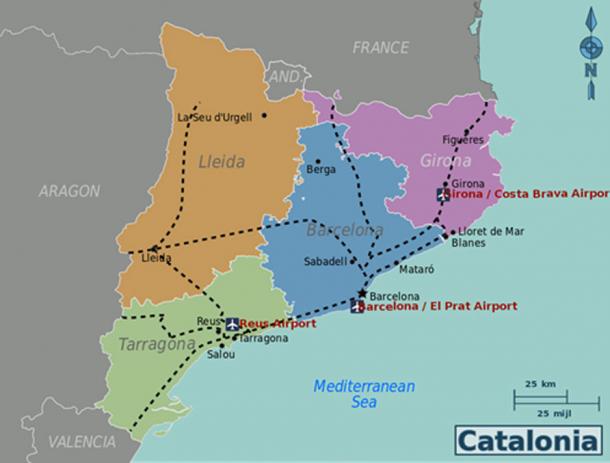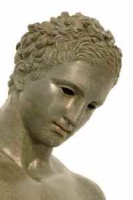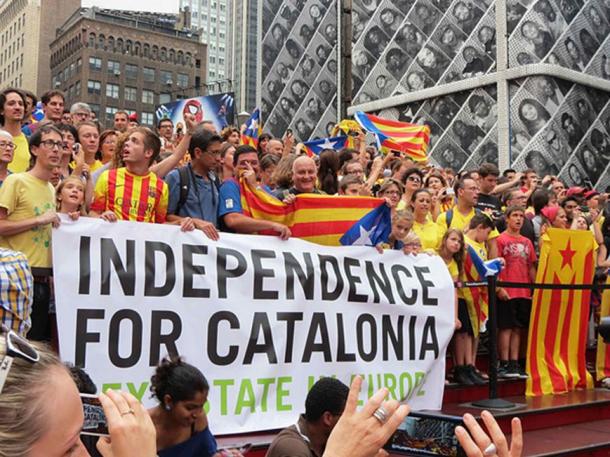Lider Katalonije: Proglasićemo nezavisnost za koji dan
Page 2 of 2
Page 2 of 2 •  1, 2
1, 2
 Re: Lider Katalonije: Proglasićemo nezavisnost za koji dan
Re: Lider Katalonije: Proglasićemo nezavisnost za koji dan
Eroo wrote:Teritorija i naroda koji živi na njemu...jezika, kulture etc.Serbinho-3 wrote:Proglasi nezavisnost na osnovu cega
Na temelju čeka bi im Madrid to mogao zabraniti?
Sile? U tom slučaju Španjolska raspada za početak na 4 dijela.
Sila danas ima ograničene domete. Pobjeda ujedno znači i gubitak.
https://en.wikipedia.org/wiki/Montevideo_Convention
The convention sets out the definition, rights and duties of statehood. Most well-known is article 1, which sets out the four criteria for statehood that have been recognized by international organizations as an accurate statement of customary international law:
The state as a person of international law should possess the following qualifications: (a) a permanent population; (b) a defined territory; (c) government; and (d) capacity to enter into relations with the other states.
Furthermore, the first sentence of article 3 explicitly states that "The political existence of the state is independent of recognition by the other states." This is known as the declarative theory of statehood. It stands in conflict with the alternative constitutive theory of statehood: a state exists only insofar as it is recognized by other states. It should not be confused with the Estrada doctrine.
A basic point should be emphasized: Article 1 is qualified by Article 11 because it prohibits using military force to gain recognition of sovereignty. Furthermore, Article 11 reflects the contemporary Stimson Doctrine, and is now a fundamental part of international law through article 2 paragraph 4 of the Charter of the United Nations.
____
prijevod za srbe - 1933 je u Montevideu uspostavljen i dogovoren princip međunarodnog prava koji se zove "samoodređenje": dakle postoji li neka država ili ne, je li ona subjekt međunarodnog prava ili ne, ne ovisi o tome je li i od koga priznata nego od toga je li se sama kao takva odredila, pod uvjetom da ima stalno stanovništvo, teritorij, i vladu koja kontrolira taj teritoriji i populaciju.
marcellus- Posts : 46005
2014-04-16
 Re: Lider Katalonije: Proglasićemo nezavisnost za koji dan
Re: Lider Katalonije: Proglasićemo nezavisnost za koji dan
Pinochet wrote:ništa od toga, španjolci će im izmasirati leđa pendrecima
aha i ovi će onda reć "evo odustajemo od neovisnosti"
_________________


marcellus- Posts : 46005
2014-04-16
 Re: Lider Katalonije: Proglasićemo nezavisnost za koji dan
Re: Lider Katalonije: Proglasićemo nezavisnost za koji dan
Jaka je Spanija da bi se EU ili USA zezale a ovom ce da izmasiraju ledja malo, zatvorski kiropraktor, Pike ce se uvlaciti javnosti kao Veliki Spanski patriota, babama ce rane zarasti ...crvenkasti wrote:Serbinho-3 wrote:Padne gradjanski i to ne u Spaniji, vec Kataloniji...
Sta ce EU u tom slucaju...
Bombardirati Madrid?

Serbinho-3- Posts : 27664
2014-08-25
Lokacija: : Italy
 Re: Lider Katalonije: Proglasićemo nezavisnost za koji dan
Re: Lider Katalonije: Proglasićemo nezavisnost za koji dan

10 Povijesni razlozi Katalonija se bori za neovisnost iz Španjolske
U Kataloniji, autonomnoj španjolskoj regiji, održano je u nedjelju, 1. listopada, održan referendum o neovisnosti - koji je smatrao protuzakonitim od strane španjolske vlade, a 90 posto Katalanaca izabralo je nezavisnost od Španjolske. Dakle, ono što je u korijenu ovog intenzivnog pogona za odvajanje? Polaganje modernih političkih razloga na trenutak, ukrcajmo se u povijesnu prošlost Katalonije kako bismo shvatili zašto mnogi katalanci čvrsto vjeruju da će jednoga dana postati neovisna država.
Gdje se nalazi Katalonija?
Katalonija je trokutasta regija u sjeveroistočnoj Španjolskoj koja je pirenačka planina odvojena od južne Francuske. Graniraju ga Francuska i Andora na sjeveru, Sredozemno more na istoku, autonomna zajednica Valencije na jugu i autonomna zajednica Aragona na zapadu.Katalonija ima 7,5 milijuna stanovnika, a obuhvaća oko 16% Španjolske populacije, rasprostranjenih u 948 općina - od kojih je najveća od kojih je barem 1,6 milijuna ljudi.

What is Happening Now in Catalonia?
On 1st October, a referendum was held in Catalonia to vote on whether they wish to become independent from Spain. Officials said that 90% of the 2.26 million who voted in the referendum voted in favour of independence, with a 42.6% turnout of the electorate. Spain's Prime Minister Mariano Rajoy rejected the result and denied that Catalonia had held a legal referendum.Guardian izvještava da je u danima koji su doveli do referenduma, policija zaplijenila milijune glasačkih listića, blokirala web stranice vezane uz referendum, razbila biračka mjesta, prisilno uklonila glasačke kutije i upozorila niz javnih dužnosnika o opasnosti od kršenja zakona. Dan samog glasovanja uočio je vrlo tešku policijsku nazočnost, uz veliku dramu i napetost koja je ostavila mjesta za izravno nasilje: policija odjevena u maske i prigušene zupčanike natjerala biračka mjesta da se zatvore, naplaćuju prosvjednicima, ispaljuju gumene metke u gomilu i nasilno tuku građani čekaju da glasaju na referendumu. Katalonska vlada tvrdila je da je ozlijeđeno više od 900 ljudi.
Danas su tisuće katalanaca otišle u opći štrajk u prosvjedu zbog policijskog nasilja
0 Povijesni razlozi Katalonija želi neovisnost iz Španjolske
1. Usprkos stoljetnim represijama osvajajucih ovlasti, katalanci su sačuvali svoj vlastiti jezik - koji sada govori 9 milijuna ljudi - a to nije dijalekt španjolskog, nego se razvio iz vulgarnog latinskog koji su govorili Rimljani, koji su kolonizirali Tarragonu.2. Katalonija ima dugu povijest koja datira iz ranog srednjeg vijeka , koja je vidjela stvaranje vlastitog carinskog i kulturnog identiteta - prve županije Katalonije osnovane su u 8. stoljeću kao rezultat kralja Karla Velikog koji pokušava uspostaviti tampon zoni između njegovog franačkog carstva i Španjolske vladajuće muslimane.
3. Osnovu onoga što bi bila buduća suverena država Katalonije nastala je u 9. stoljeću. Smatrao je utemeljiteljem Katalonije, Guifré el Pilós (Wilfred the Hairy) ujedinio je nekoliko katalonskih županija i postao prvi nezavisni grof Katalonije.

Statue of Wilfred the Hairy in Madrid

Yehudi- Posts : 14715
2014-04-20
 Re: Lider Katalonije: Proglasićemo nezavisnost za koji dan
Re: Lider Katalonije: Proglasićemo nezavisnost za koji dan
4. Catalonia was a powerful region and a major sea power – Catalonia emerged as a distinct entity with the rise of the County of Barcelona to pre-eminence in the 11th century, and when the marriage between Ramon Berenguer IV and Queen Petronilla of Aragon resulted in a dynastic union with the Kingdom of Aragon, it became a major medieval sea power.
5. Catalonia had its own traditional rights and parliament from as early as the 12th century – although Catalonia was brought under the same royal rule as the neighbouring kingdom of Aragon in the 12th century, Catalonia kept its own traditional rights and parliament, the Corts Catalanes, which remained in place until the 18th century. The Catalan Courts had the force of the law in the sense that the king could not unilaterally revoke them.

Ferdinand II of Aragon on his throne flanked by two shields with the emblem of the royal signet
. Frontis of a 1495 edition of the Catalan Constitutions
6. Catalonia revolted against King Philip IV of Spain – In the 15th century, Catalonia lost its autonomy when King Ferdinand of Aragon and Queen Isabella of Castile married and united their realms, laying the foundations of the Kingdom of Spain. However, during the reign of King Philip IV, Catalan peasants were forced to host an army which was fighting against the French King even though Catalans had enough problems defending Catalan territory. They revolted and declared a republic under French protection. It was to be a short-lived independence and by 1714, the Catalan State was completely abolished. Catalonia was brought under the rule of Madrid and administrative use of the Catalan language was banned.
7. Catalonia had achieved brief independence under Napoleon - During the Napoleonic Wars, Spanish and French armies fought against each other over several years. In 1810, Napoleon decreed that Catalonia was an independent Republic under his guardianship. But he had a change of heart. In 1812, he annexed Catalonia to France, and it became part of the Spanish Kingdom again in 1814 when the French were defeated.
8. The 19 th Century Saw the Rise of Nationalist Sentiment – In the 19th century, Catalonia experienced a cultural renaissance. There was a powerful movement to revive Catalan culture, traditions and language, which flowed into a campaign for political autonomy and separatism.
9. Broad Autonomy Achieved in the 20th Century – At the beginning of the 20th century, Catalonia regained its united administrative system and a certain degree of self-rule. In 1931, the elections were won by Francesc Macià, who proclaimed the short-lived Republic of Catalonia. Three days later, he agreed on the establishment of an autonomous government for Catalonia with the newly-formed Spanish Republic.
10. Repression Leads to Greater Push for Independence – In 1936, a military coup was launched in an attempt to overthrow the Republic, sparking the Spanish Civil War. In 1938-9 – General Francisco Franco’s forces overran Catalonia. The President of the Catalan Government was executed by firing squad. Under Franco’s fascist dictatorship, which lasted nearly 40 years, there was a wide-scale suppression of Catalan autonomy, language and culture. Thousands of Catalan activists were executed or went into exile, and the Catalan language was forbidden in all public sectors. This suppression only served to fuel the fire of the Catalan’s deep desire for independence.
Following the death of Franco in 1975, Catalonia’s official autonomy within Spain, known as the Generalitat, was restored. Catalan’s mobilized to make their voices heard and they have been shouting for independence ever since.

The referendum may be over, but the stakes remain high. In the weeks and months to come, the crisis could lead to the fall of the Spanish government, and the Catalonian one at that. The dream of an imminent independent Catalan state has been shattered for now, but those Catalans who support independence are more alienated from Spain than ever before.
Top image: Guifré el Pilós (Wilfred the Hairy), Founder of Catalonia, Slaying a Dragon. Cathedral of Barcelona. Spain.
5. Catalonia had its own traditional rights and parliament from as early as the 12th century – although Catalonia was brought under the same royal rule as the neighbouring kingdom of Aragon in the 12th century, Catalonia kept its own traditional rights and parliament, the Corts Catalanes, which remained in place until the 18th century. The Catalan Courts had the force of the law in the sense that the king could not unilaterally revoke them.

Ferdinand II of Aragon on his throne flanked by two shields with the emblem of the royal signet
. Frontis of a 1495 edition of the Catalan Constitutions
6. Catalonia revolted against King Philip IV of Spain – In the 15th century, Catalonia lost its autonomy when King Ferdinand of Aragon and Queen Isabella of Castile married and united their realms, laying the foundations of the Kingdom of Spain. However, during the reign of King Philip IV, Catalan peasants were forced to host an army which was fighting against the French King even though Catalans had enough problems defending Catalan territory. They revolted and declared a republic under French protection. It was to be a short-lived independence and by 1714, the Catalan State was completely abolished. Catalonia was brought under the rule of Madrid and administrative use of the Catalan language was banned.
7. Catalonia had achieved brief independence under Napoleon - During the Napoleonic Wars, Spanish and French armies fought against each other over several years. In 1810, Napoleon decreed that Catalonia was an independent Republic under his guardianship. But he had a change of heart. In 1812, he annexed Catalonia to France, and it became part of the Spanish Kingdom again in 1814 when the French were defeated.
8. The 19 th Century Saw the Rise of Nationalist Sentiment – In the 19th century, Catalonia experienced a cultural renaissance. There was a powerful movement to revive Catalan culture, traditions and language, which flowed into a campaign for political autonomy and separatism.
9. Broad Autonomy Achieved in the 20th Century – At the beginning of the 20th century, Catalonia regained its united administrative system and a certain degree of self-rule. In 1931, the elections were won by Francesc Macià, who proclaimed the short-lived Republic of Catalonia. Three days later, he agreed on the establishment of an autonomous government for Catalonia with the newly-formed Spanish Republic.
10. Repression Leads to Greater Push for Independence – In 1936, a military coup was launched in an attempt to overthrow the Republic, sparking the Spanish Civil War. In 1938-9 – General Francisco Franco’s forces overran Catalonia. The President of the Catalan Government was executed by firing squad. Under Franco’s fascist dictatorship, which lasted nearly 40 years, there was a wide-scale suppression of Catalan autonomy, language and culture. Thousands of Catalan activists were executed or went into exile, and the Catalan language was forbidden in all public sectors. This suppression only served to fuel the fire of the Catalan’s deep desire for independence.
Following the death of Franco in 1975, Catalonia’s official autonomy within Spain, known as the Generalitat, was restored. Catalan’s mobilized to make their voices heard and they have been shouting for independence ever since.

What Happens Next?
Spain will not let go of Catalonia easily. The Catalan region has long been the industrial heartland of Spain – first for its maritime power and trade in goods such as textiles, but now for finance, construction, agriculture and hi-tech companies. Today, it is among Spain's most prosperous regions, contributing a fifth of the country's 1.1 trillion-euro ($1.32 trillion) economy.But this victory comes at a very high price. Rajoy’s government hoped to prevent the vote without police sequestering ballot boxes using violent tactics on ordinary people; instead, the spectacle of police preventing people from voting and attacking protesters, has done deep damage to Spain’s international credibility, and helped poison relations between Catalonia and Madrid even further.“Crudely speaking, Spain’s prime minister, Mariano Rajoy, got his wish,” reports The Conversation . “He promised a referendum would not occur, and his government successfully ensured that what transpired on the day was too incoherent and chaotic to be legitimate.”
The referendum may be over, but the stakes remain high. In the weeks and months to come, the crisis could lead to the fall of the Spanish government, and the Catalonian one at that. The dream of an imminent independent Catalan state has been shattered for now, but those Catalans who support independence are more alienated from Spain than ever before.
Top image: Guifré el Pilós (Wilfred the Hairy), Founder of Catalonia, Slaying a Dragon. Cathedral of Barcelona. Spain.

Yehudi- Posts : 14715
2014-04-20
 Re: Lider Katalonije: Proglasićemo nezavisnost za koji dan
Re: Lider Katalonije: Proglasićemo nezavisnost za koji dan
a dobro,nek imaju drzavu,kasnije ih Jusa bude stavila na svoju listu za guženje,poput ostalih malih samonedostatnih fukojebina....deze vuuu 


Guest- Guest
 Re: Lider Katalonije: Proglasićemo nezavisnost za koji dan
Re: Lider Katalonije: Proglasićemo nezavisnost za koji dan
podrska bratu kimu i kataloncima da se odbrane od imperijalista :D
_________________
 Re: Lider Katalonije: Proglasićemo nezavisnost za koji dan
Re: Lider Katalonije: Proglasićemo nezavisnost za koji dan
Proglas sam po sebi neće značiti ništa. Njeka budu uporni i postići će cilj makar i za pola stoljeća.
_________________


Regoč-

Posts : 35954
2015-08-21
Age : 106
Lokacija: : Doma
 Re: Lider Katalonije: Proglasićemo nezavisnost za koji dan
Re: Lider Katalonije: Proglasićemo nezavisnost za koji dan
Malo sam gledao demografiju Katalonije.....46% populacije govori kastilijanski, 36% populacije govori katalonski, preko 40% populacije uopće nije ni rođeno u Kataloniji, ako ćemo gledati naše krajeve onda je ovo izjašnjavanje po jeziku više političko, nego lingvističko.
Ukratko ekonomski prosperitet zadnjih 50 godina im je sjebao demografiju.
Ukratko ekonomski prosperitet zadnjih 50 godina im je sjebao demografiju.

Gost- Guest
 Re: Lider Katalonije: Proglasićemo nezavisnost za koji dan
Re: Lider Katalonije: Proglasićemo nezavisnost za koji dan
Bežanija firmi iz Katalonije...
http://mobile.ilsole24ore.com/solemobile/main/art/mondo/2017-10-06/fuga-catalogna-ecco-aziende-che-spostano-sede-e-chi-ci-pensa----163017.shtml?uuid=AEU7nSgC
http://mobile.ilsole24ore.com/solemobile/main/art/mondo/2017-10-06/fuga-catalogna-ecco-aziende-che-spostano-sede-e-chi-ci-pensa----163017.shtml?uuid=AEU7nSgC

Serbinho-3- Posts : 27664
2014-08-25
Lokacija: : Italy
 Re: Lider Katalonije: Proglasićemo nezavisnost za koji dan
Re: Lider Katalonije: Proglasićemo nezavisnost za koji dan
Upali ste u zamku kaosa....

red wolf-

Posts : 15947
2016-02-10
Lokacija: : Svemir
 Re: Lider Katalonije: Proglasićemo nezavisnost za koji dan
Re: Lider Katalonije: Proglasićemo nezavisnost za koji dan
Granice...Granice...Odjebite te granice više...Neka nestanu...

red wolf-

Posts : 15947
2016-02-10
Lokacija: : Svemir
 Re: Lider Katalonije: Proglasićemo nezavisnost za koji dan
Re: Lider Katalonije: Proglasićemo nezavisnost za koji dan
nebihs e slozio,granica između dobra i zla treba psotojati ianc ebi sve bilo sivilored wolf wrote:Granice...Granice...Odjebite te granice više...Neka nestanu...
ljudi imaju slobodnu volju neka ju iskoriste u ovo vrijeme gdje mnogi sputavaju druge ljude
red ej da vlasti an planeti ZEmlja padnu
ako netko zeli biti ehzavisam i ljudi tako odluce to je Bozja volja a nametanje drugima silom je nesto lso
dakle odjebi
kada vratims ve Moci rkenuti cu na sve opa i na tebe
ti koji ljudima govoris da bi trebali biti psolusnici
dakle zasuti dok jos mozes jer ja mogu unsititi i duh puno jaci od ljudskoj uskoro
sto se tice granica nece ih biti za one koje uđu u Kraljevstvo NEbesko a i oni u Paklu svakome po njegovim djelima
samo zapamti i ti se pratis,sva stvorena bica su na TESTU,a ti bas nisu Boziji da se tako izrazim
u ovomt renutnu na ZEmlji vlada Lucifer i on nezeli mijenjanje ja ZELIM,a za tebe me zaboli,ljudi trebaju rpestati biti robovi ljduskih zakona i samos e bazirati na Bozji zakon koji je trajan a ne ovi

Guest- Guest
 Re: Lider Katalonije: Proglasićemo nezavisnost za koji dan
Re: Lider Katalonije: Proglasićemo nezavisnost za koji dan
The Islamic Republic of Catalonia
https://www.gatestoneinstitute.org/3393/catalonia-islamic-republic
https://www.gatestoneinstitute.org/10887/barcelona-attack
pola separatista su muslimani i imigranti koji žele stvoriti prvu islamsku državu na tlu EU

Guest- Guest
 Re: Lider Katalonije: Proglasićemo nezavisnost za koji dan
Re: Lider Katalonije: Proglasićemo nezavisnost za koji dan
ljudima ej dana SLobodna volja neka ju koriste,dos ad aljudi su bili najvecim dijelom roblje ,neka se probude,neka kazu ja sma za zlo ili JA sam za DOBRO
granice se MROAJUs tvoriti i bice JEDNI za Boga a Drugi PROTIV Boga
doslo je vrijeme da se ljudi probude i neka kaze kome pripadaju
granice se MROAJUs tvoriti i bice JEDNI za Boga a Drugi PROTIV Boga
doslo je vrijeme da se ljudi probude i neka kaze kome pripadaju

Guest- Guest

Regoč-

Posts : 35954
2015-08-21
Age : 106
Lokacija: : Doma
Page 2 of 2 •  1, 2
1, 2
 Similar topics
Similar topics» "Niko u Evropi neće priznati nezavisnost Katalonije"
» Mostar dobio pa izgubio Trg Katalonije
» EU podržava Madrid protiv Katalonije
» Madrid suspendovao vladu Katalonije, autonomija ostala
» Nakon Katalonije jug Srbije traži ujedinjenje sa Kosovom
» Mostar dobio pa izgubio Trg Katalonije
» EU podržava Madrid protiv Katalonije
» Madrid suspendovao vladu Katalonije, autonomija ostala
» Nakon Katalonije jug Srbije traži ujedinjenje sa Kosovom
Page 2 of 2
Permissions in this forum:
You cannot reply to topics in this forum
 Events
Events Latest images
Latest images
 by marcellus 4/10/2017, 12:50
by marcellus 4/10/2017, 12:50